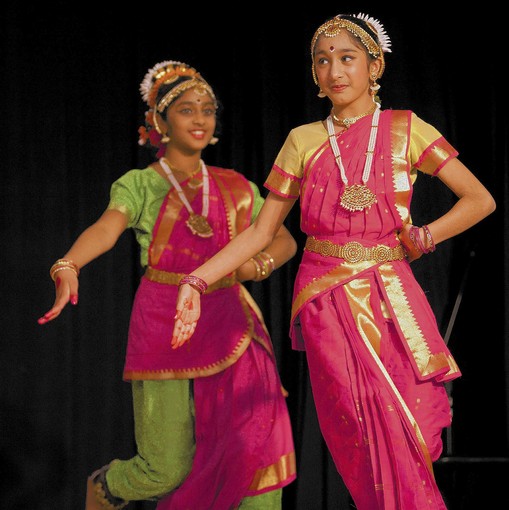Upon arriving in the Lehigh Valley in the late 1980s, Ashim Bhowmick’s goal was to instill in his daughters the importance of becoming vital members of the community while embracing their Bengali heritage.
On Saturday, he took pride in a job well done.
Several generations at the Hindu Temple Society observed Saraswati Puja, a celebration of the coming of spring, with prayer and worship. Boys and girls in traditional dress took stage to perform music and dance, while young adults later shared memories of 25 years of Saraswati Puja at the temple in Hanover Township, Lehigh County.
For Bhowmick, 67, president of the Indian American Association of the Lehigh Valley, it was an opportunity to smile while watching his daughter, Puja Rana, 33, share from the stage her memories of the 15 Bengali families who settled here in the late ’80s and began celebrating Saraswati Puja at the temple in 1990.
“We took steps to make them good citizens of this country, while maintaining the culture,” he said of himself and his wife, Mita.
Rana, a 1998 graduate of Parkland High School, earned a master’s degree in risk management from St. John’s University. Piya Bhowmick, 30, also a Parkland grad and present Saturday, is completing a three-year residency in family medicine at Lehigh Valley Hospital. Payal Bhowmick, 28, holds a master’s from Lehigh University and lives in Dallas, where she teaches middle-school English.
Rana gave credit to her parents for the sisters’ achievements. “It’s really shocking to me to realize how much sacrifice our parents made,” Rana said.
Bhowmick said he and his wife stressed the importance of becoming “part of the fabric” of the community to their daughters while embracing their native heritage. That was evident Saturday as his daughters, like others, attended wearing colorful saris.
“It’s a balancing act — if we raise them as Indians in an adopted country, they will lose everything,” he said. “Giving them the heritage and at the same time making them part of the local family is a big trick.”
Census figures show the Indian population in the Lehigh Valley is 4,500, their numbers having increased by 70 percent in Lehigh County since 2000 while nearly tripling in Northampton County. Bhowmick says the actual number is closer to 5,000, and feels sure it will continue to swell as others from his native land, be they Hindu, Sikh, Buddhist or Jain, are drawn to the Valley by its educational and technical career opportunities.
A past temple board member, Bhowmick said attendance for major events — such as Holy Function in late spring and Diwali, a five-day celebration in autumn — has risen from about 300 in the early 1990s to nearly 900 today. Speaking on behalf of the current temple board chairman, Raman Malhotra, who was not present Saturday, Bhowmick said the number of Indian-Americans which it serves is best gauged by event attendance rather than membership.
“At any time we attract a substantial number of people, maybe 30-40 percent of the (local) population,” he estimated.
That, he said, triggered expansion in 2004-’05, when space was increased by about a third and an elevator installed to accommodate early settlers like himself and Mita, who first came to the United States in the 1970s and the Lehigh Valley in 1988. “We’re all getting older,” he said.
After the morning prayer rituals to honor and worship Saraswati, goddess of learning, knowledge and wisdom, children performed song and dance before adults like Rana took stage to share remembrances of the earlier celebrations.
Rana, who left a career to become a mother, said teaching her daughter Bengali tradition will be difficult because her husband, while Hindu, is not from Bengal. “My generation will face additional challenges,” she said.
And like any other close-knit community tied by religious beliefs, she said the 15 families who began the tradition of celebration at the temple looked out for one another.
“That’s true of any immigrant community,” said Neal Sengupta, 26, a Freedom High School and Duke University graduate whose family was among them. “We always had this temple and our organization of families to support us.”






